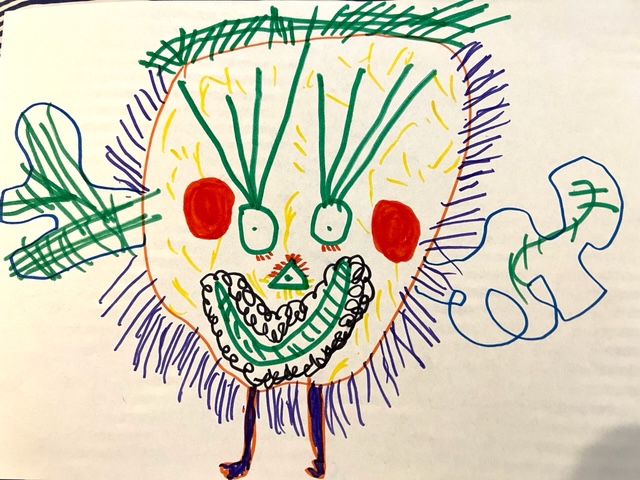Series Title: Children’s Minds in the Line of Fire
Article Title: On Psychic envelopes and spaces for young children during the pandemic
Author: Christine Anzieu Premmereu
We are almost 2 years into the most serious global health crisis of our lives. Adults are experiencing a fear of death, chaos in their professional and social lives, and mourning the loss of their friends and family. Irrational decisions, emotional explosions and violence seem to be the discharge of that excess stress. But what do babies and children experience?
The persistence of trauma, the pandemic, and the confusion of events, gives rise to what the French analyst Andre Green would call a disconnection between Eros and Thanatos. Hence, primitive defences are activated. We observe externalisation, projection, and denial, the displacement into the other of a psychic suffering that cannot be worked through. Emotional withdrawal and avoidance of contact in the state of high alert are other characteristics of these situations.
The global prevalence of depression and anxiety in children and adolescents during Covid-190has doubled.
It’s time to promote mental health from the beginning of life, to support parents and infants while they build a new brain and a young Ego that can not only think but also manage anxieties. When relatedness is disappearing, psychoanalysts are good at using their own awareness of their affects to maintain communication and pleasure of being together. Playfulness is at risk; psychoanalysts are the ones who know about the essence of libidinal creativity.
It seems that babies don’t mind looking at their masked mother, but they do mind if she is not responding to their face, like in the still face experiment.
Ed Tronick has used his well-known research to compare the baby’s reactions when the mother interrupts interaction, with those when the mother wears a mask. The masked mothers express in many ways their attunement and communication with their infant using their eyes, their voice, and physical contact. Babies react quite well to their masked parents and feel them smiling under the mask. (See
video)
Toddlers have been extra clingy, putting a lot of pressure onto their parents. The more they have been put aside by exhausted parents, the more they were in need of comfort. The child is looking for physical contact when feeling disorganised, while the mother is yearning for space. To be physically close is developmentally appropriate for a young child. The function of physical contact for babies is to establish a secure attachment and formulate a sense of self; physical contact is extremely soothing. Body contact is not only connection, it’s delineation because you feel that you are owning your body and your feelings when you are in close connection with a mirroring figure.
It was pleasurable for some children to share increased time with their parents during the lockdowns. But the risk was to create a sort of libidinal stagnation with increased hostility and unsatisfied demands from unavailable parents.

A 6-year-old girl was having intense tantrums and screaming that shocked her parents. She seemed to me to be a quite precocious girl, but extremely shocked by her busy at home parents unable to take care of her little brother, a toddler always in need for rapprochement. Full of rage, the girl has tried to make the life of her mother a total disorganisation. A few sessions on a screen helped for a change. She reported having nightmares where the virus was attacking her parents. I talked about her anger, and she drew a frightening representation of a virus enjoying making her family helpless. (See drawing)
This amazing girl developed a new interest for spaces in sessions on FaceTime, how the different rooms in the apartment didn’t allow for privacy or intimacy. While I played at being squeezed in a tiny suffocating room, she discovered many secret spaces where she could spend time alone, by reading, dreaming, regressing, and being creative: she labelled our common secret “the bubble”, the shared space we had together in the virtual world. We created an envelope that gave the sense of being wrapped in the mind of one another, like a skin.
Social catastrophe produces a narcissistic injury that breaks the balance between strangeness befriended and total otherness, a source of persecutory anxiety, lack of solidarity. Isolation activates helplessness and vulnerability, provoking feelings of futility and uselessness, as distrust and aggression. The virus as an invisible enemy - a representation displaced into others in a primitive split between good and bad, leading to cognitive distortion; an inadequate style of coping when many are in a state of grieving. Poor libidinal transfer to ties with others cause loss of empathy. Creating new spaces, even on-screen during sessions, is a way to respond to the longing for new ways of meeting and understanding conflicted emotions and complex feelings. This has to do with some fundamentals in early development like the metaphor of a psychic envelope: being wrapped in a maternal space, a physical as well as mental skin.
We observed during the pandemic in adults and children, and especially with adolescents, issues of containment, stimulation and regression due to a lack of touching and fear of being touched. Some were more on the regressive side, looking for a metaphoric maternal space by passively clinging to each other, eating, drinking, and smoking, all of which are oral satisfactions that give a short relief. Infantile sexuality was replayed in parents and children, as the internal resource to be shared. Working on a screen was a wonderful tool for playfulness with the imagination deployed to deal with the lack of a real body. Maintaining liveliness, in erotic as in aggressive capacities, even in a time of grief employed metaphors, with words that maintain a sense of touch.
Tronick, E., & Snidman, N. Children's Reaction to Mothers Wearing or Not Wearing a Mask During Face-to-Face Interactions. Available at SSRN 3899140.